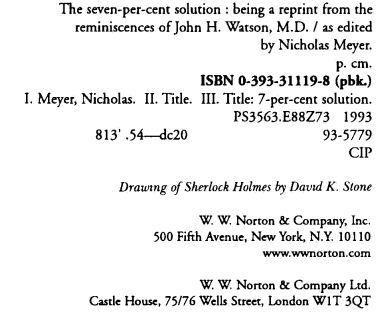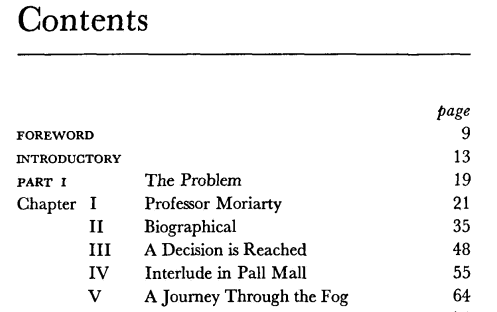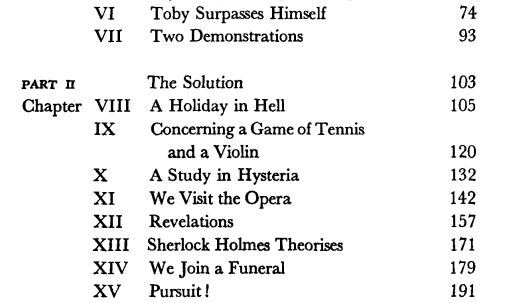Nicholas Meyer
Authors: The Seven-Per-Cent Solution (pdf)



The Seven-Per-Cent Solution
Being a Reprint from the Reminiscences of John H. Watson, M.D.
as edited by Nicholas Meyer






Foreword
The discovery of an unpublished manuscript by John H. Watson may well engender in the world of letters as much skepticism as surprise. It is easier to conceive of the unearthing of one more Dead Sea Scroll than yet another text from the hand of that indefatigable biographer.
Certainly there has been a surfeit of forgeries—some of them admittedly well done and others merely preposterous—so that the appearance of one more supposedly authentic chronicle may automatically arouse bored hostility in the breasts of serious students of the Canon. Where did this one come from and why not before now? are the inevitable questions students are forced to pose time and time again, before going on to catalogue the myriad of inconsistencies in style and content that brand the piece a hoax.
For the present manuscript, it does not much matter whether or not I believe it to be genuine; for what it is worth, let me say that I do. As to how it came into my possession, that is frankly a matter of nepotism as the letter from my uncle, quoted in full below, will serve to indicate.
London, March 7th 1970
Dear Nick—
I know that both of us are busy so I'll come right to the point. (And you needn't worry,
the enclosed bundle does not represent my attempt to make a stock-broker's life look
glamourous and/or easy!)
Vinny and I bought a house in Hampshire three months ago from a widower named
Swingline (if you can believe!). The poor man's wife had just passed on—she was only
in her middle fifties as I understand it—and he was quite broken up; couldn't wait to
leave the house. They'd lived in it since the war, and the subject of the attic was simply
too painful to bear. All the effects and mementos and papers (how much one
accumulates during a lifetime!) that he wanted were in the house proper, and he said if
we didn't mind clearing out the attic ourselves, anything we found up there we could
keep!
Well, it isn't always you get to rummage around in someone else's junk and take what
you like but, to be truthful, the more I thought of doing it, the less enthusiastic I became.
The place was jammed with furniture, bric-a-brac, standing lamps, dusty what-nots, and
even old travelling steamer trunks (!), but there was something distasteful about going
through poor Swingline's past—even with his permission.
Vinny, even though she felt the same way, is a homemaker. She wondered if there was
anything we could use up there, furniture prices being what they are, and also she had
items of our own she wanted to store out of the way. So up she went and down she came,
choking with dust and smudged all over like a chimneysweep.
I won't bore you with all the details, but we found the enclosed, Xeroxed a copy, and are
sending it on to you. Apparently the late Mrs. Swingline was a typist (her maiden name
being Dobson), and in that capacity she worked at the Aylesworth Home, an old folks'
affair recently taken over by National Health (hurrah, hurrah). In the course of her
work—which included helping the patients write letters— she transcribed onto her
typewriter (also in the attic, by the by, and in mint condition) the enclosed, which was
dictated to her—he states so himself—by one "John H. Watson, M.D."!!!
It took me a while to read the thing and I was three pages or more into what he calls his
"Introductory" before I realized what the hell it was. Of course it occurred to me the
whole thing might be some sort of incredible hoax, a hoax that never came off and got
buried in an attic, so I checked into it. In the first place, Swingline knew nothing about
it. I asked him casually and he didn't recall it at all, much less express any interest. Then
I went to Aylesworth Home and asked them to check the files for me. There was some
question about whether they were still accurate that far back—the war messed up
everything—but my luck held good. In 1932 a Dr. John H. Watson was admitted (with
severe arthritis), and it stated in his health record that he had been attached to the Fifth
Northumberland Fusiliers! There could no longer be any doubt, at least in my mind,
and I would fain have looked at the record in detail (wouldn't you have liked to know
where Watson was really wounded?) but Matron wouldn't let me. She hadn't the time to
stand around, she said, and the file was confidential. (Ah, bureaucracy, what would
National Health do without you?)
Anyway, it offers substantial confirmation as to the authenticity of the enclosed, which I
am forwarding to you for whatever purpose you think best. You are the Sherlockian in
the family and will know what to do with it. If it comes to anything we split the profits!!
Fondest regards to you,
Henry
PS: Vinny says we have to cut her in, too—she found it.
PPS: We are retaining the original MS. We'll see if Sotheby's is interested in auctioning
it!
Authentic or not, the manuscript required editing, and preparing a definitive edition of Plutarch could not be more difficult than the problems posed by a newly unearthed text of Watson's. I corresponded extensively with Sherlockians too numerous to mention here; all of them proved invaluable, tireless in offering advice, comments, and insights regarding the newly discovered material. The only proper acknowledgement of the debt this book owes them is the book itself. I have, with their help, preserved as much of Dr. Watson's narrative as makes for a consistent story.
For reasons which are not definitely known, Watson never (to our knowledge) got to edit the
manuscript. His own death, possibly, or the vagaries of the war prevented him. Therefore, in readying the work for publication, I have tried to function as I believe he would have. I have struck out redundancies. Old people have a tendency to repeat themselves, and although Watson's memory of events apparently remained intact, he was prone in his dictation to reiterate significant details. I have also eliminated digressions which he made from time to time when his mind appears to have strayed from the story and wandered unchecked into the intervening years. (These memories are themselves not without interest and in subsequent editions I shall no doubt include them in the form of